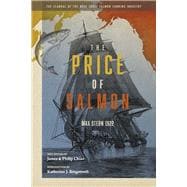In 1922, San Francisco Daily News investigative journalist, Max Stern, posed as a down-on-his-luck cannery workers to uncover corrupt hiring practices and deplorable labor conditions employed by Chinese contractors and Alaska salmon canners. Stern's collective articles spotlighted the discrimination, exploitation, profiteering, and mistreatment of cannery crews and exposed the corrupt, abusive practices of the labor contract system.
In thirty-seven articles published daily between September 24 and November 8, 1922, Stern described his journey to Alaska, embarking from San Francisco and sailing to the shores of the Nushagak River in Bristol Bay, the easternmost arm of the Bering Sea. Stern shared with readers breathtaking accounts onboard American made bark, Emily F. Whitney, one of the notorious "Hell Ships." He vividly described risk and danger, labor unrest, fish waste, poor food and living quarters, and the industry's impact on the Chinese gang which included a striking diversity of workers from many races and national origins.
Stern's trip was the most unusual newspaper assignment of the year. His work is an exposé of the scandal of the coastwide salmon canning trade, which eventually led to the collapse of the Chinese contract system. The writing covers a lot of ground, including early twentieth century recruiting practice in San Francisco, living and working conditions aboard a "Hell Ship" and in Alaska, race and nationality, immigrants, capitalist system during 2nd industrial revolution, salmon canning trade, San Francisco underworld, Chinese contract system, Alaska canneries and natives.
More real than fiction, Stern's adventure aboard a "Hell Ship" to Alaksa was filled with suspense and drama. It was a deep dive into of the underworld of the salmon canning trade, populated by greedy owners, corrupt contractors, and Chinese Gang of many races, tongues, and nationalities. Desperate men were pressed to surrender to "Man's inhumanity to man.". It is a remarkable piece of journalism and literature of the American West in the early 20th Century.








